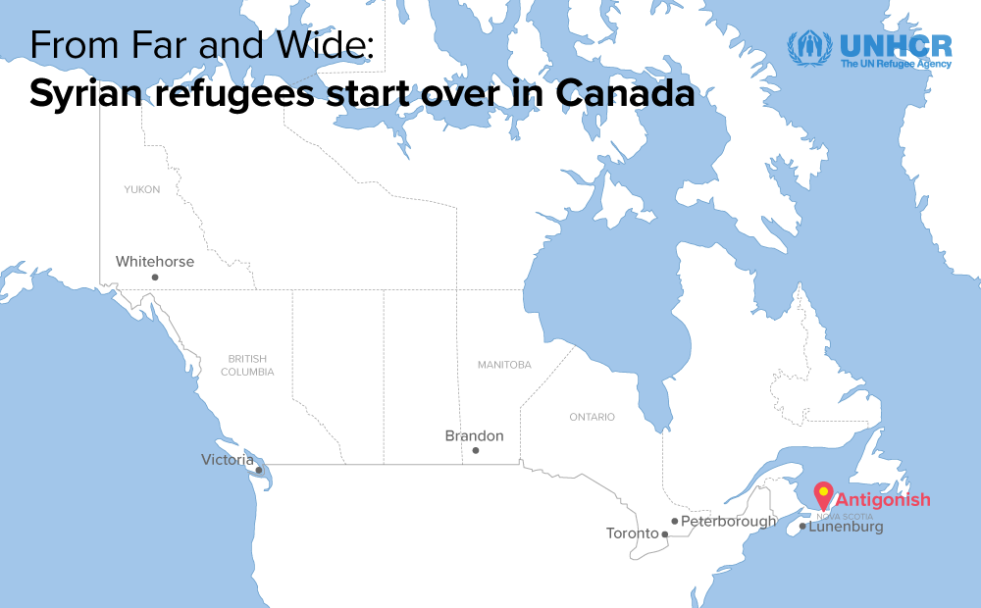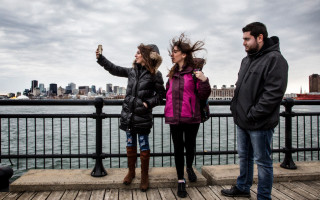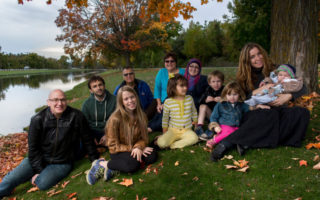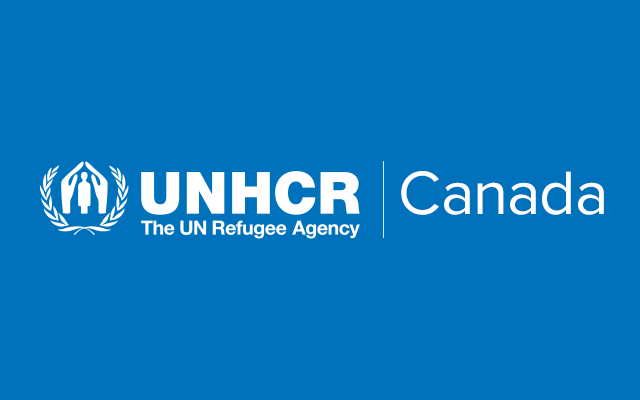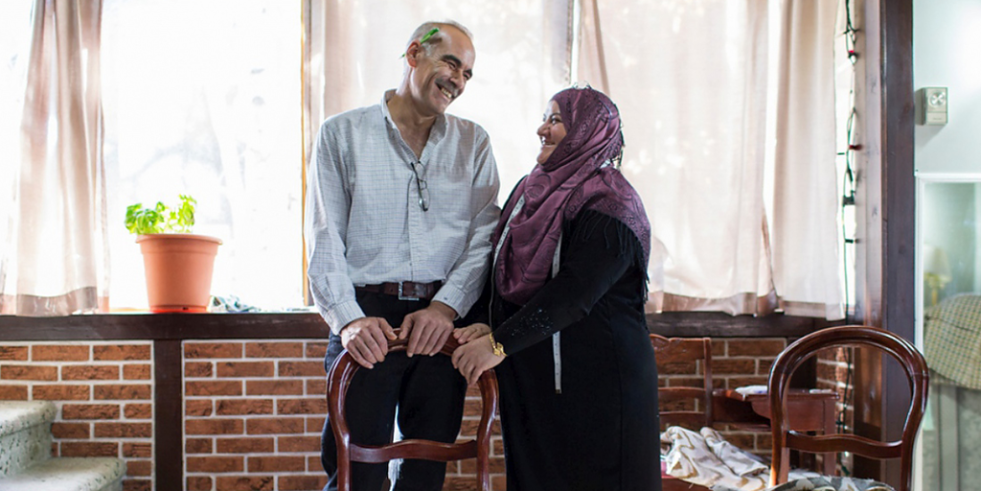
Toufic and Rabiaa fled conflict back home in Al-Qusayr, Syria. © UNHCR/Annie Sakkab
With the help of sponsors, Rabiaa Al Soufi’s skills have become a valued part of one tight-knit community in Nova Scotia, Canada.
By Leyland Cecco and Annie Sakkab in Antigonish, Canada
When a local hockey coach phoned Rabiaa Al Soufi, she didn’t hesitate before agreeing to help. Fifty hockey jerseys were dropped off at her house, all needing name plates sewed on as soon as possible.
Rabiaa quickly got to work, spending the next few nights hunched over a whirring sewing machine, the yellow bulb casting shadows across the living room-turned-workshop. Her husband and children helped out where they could, eager to make a good impression on the community that had recently welcomed the family.
With skills honed from years of teaching sewing and tailoring in Syria, a heap of finished jerseys piled up quickly. “Even though this is a very simple thing, I am grateful that of all people I was able to provide this to them,” says Rabiaa.
The five members of the Al Zhouri family were resettled to the town of Antigonish, on Canada’s eastern shores, in January 2016. The country’s help could not have come soon enough; the Al Zhouris had fled conflict back home in Al-Qusayr, Syria, for Lebanon and, for five years, had been unable to work or attend school.
For both Antigonish and the province of Nova Scotia, the intake of refugees served two purposes: to give shelter to those in need and to grow a dwindling population with capable workers. For generations, young, skilled men and women had left for better-paying jobs in the western part of the country. By the end of 2016, Nova Scotia hopes to have resettled 1,500 Syrians.
“You feel like you left your soul, you left your heart there.”
Soon after arriving, the quiet emptiness of the winter surprised Rabiaa. The days of social gatherings at her house in Syria – the laughter and chatter of neighbours passing by— were over. For the first five months, she felt alone. “I felt depressed. The world started closing up on me,” she says. “I only had my kids here and no one else.”
Her mind often drifted back to her home in Syria and the war. She and other families would huddle in a cramped bathroom, the safest location, as bombs and airstrikes destroyed the city.
Their home became increasingly dangerous for her eldest son, Majd, and husband Toufic, both targets for recruitment and detention. Fleeing to a nearby village, they spent weeks hidden in an orchard. Contact with them was intermittent – they would often go two months without an internet connection as they moved around. Each time Rabiaa heard news of casualties, uncertainty would wash over her. “You feel like you left your soul, you left your heart there,” she says. “You only left with your body. Your soul and your mind is with them.”
The family’s sponsors in Canada have given them new hope and strength.
“You take on a private sponsorship of a refugee family and the motivation to do that is to provide a family in need with a secure, safe place – a haven,” says Cindy Murphy, one of the residents who sponsored the Al Zhouri family. She and other sponsors made an effort to bring Rabiaa to social events as often as possible. Through this, the two became closer, developing a strong bond. “I would have to say, bar having my children and getting married, this is one of the most important things that I’ve ever done,” says Cindy.
The large group of sponsors, made up of community members and university students, often spent hours at Rabiaa’s house, drinking tea and conversing. As her mood brightened, Rabiaa started baking and sewing again – jobs she’d once thrown herself into in Syria.
“This is one of the most important things that I’ve ever done.”
What began as a way to fill her days soon turned into a small business. Her sponsors arranged for a table at the weekly farmer’s market – a place to sell Syrian pastries.
“With the farmer’s market, even though it’s once a week, it helped me a lot with my social life. I found so many friends,” says Rabiaa.
Then, after staring at a worn couch in their new home, she crafted a cover, selecting fabrics and poring over measurements. When her sponsors visited, they marveled at the stitching and design.
Soon, word got out in the small town that Rabiaa’s talents extended further than baking. Customers would leave her table at the market with a small package of cookies and appointments for tailoring or upholstering. Working alongside Toufic, a skilled carpenter, the couple created a niche service in the area. Sponsors helped Rabiaa design and print business cards, and created a Facebook page to attract customers.
“It’s almost like there’s been a very strong energy that’s been released from her,” says Cindy. “She has an incredible work ethic and just doesn’t say no. She’s amazing.”
Soon, the Al Zhouri’s living room was a collection of chairs and fabric. Knocks on the door soon became familiar; residents streamed into the house with new jobs for the family.
And as Rabia’s presence in the community grew, her family’s did too. Her eldest son, Majd, between a job and school, took the lead in a community theatre play to improve his English and confidence. Her younger children, Ranim and Aghyad, volunteered in the community and devoured textbooks, quickly becoming fluent in English. Her husband built a reputation as a precise carpenter, able to fuse Middle Eastern design with Canadian style. Amid the family’s growing successes, the sponsors helped where they could.
“It’s an enriching process to be working alongside newcomers,” says Cindy. “But I’m going to have to stop using that word in a little while. Because, really, they’re very much a fabric of our community.”
From Far and Wide is a series of stories profiling the Canadians who have welcomed Syrian refugees with compassion and support. All across the country, strangers, friends, families and communities are creating powerful bonds of friendship that transcend language and culture, when they are needed the most.
Tell refugees your city stands with them
Your city is stronger and more connected because refugees are here, becoming colleagues, neighbours, and friends. Ask your mayor to officially stand with refugees and cities across the world by signing the UNHCR Statement of Solidarity with Refugees. Tell your city you stand #WithRefugees.
Originally posted by UNHCR on 15 December 2016



